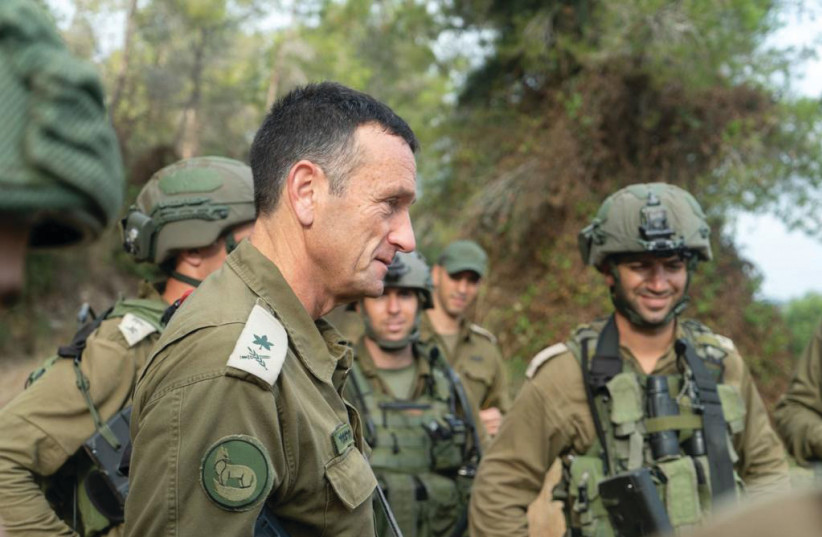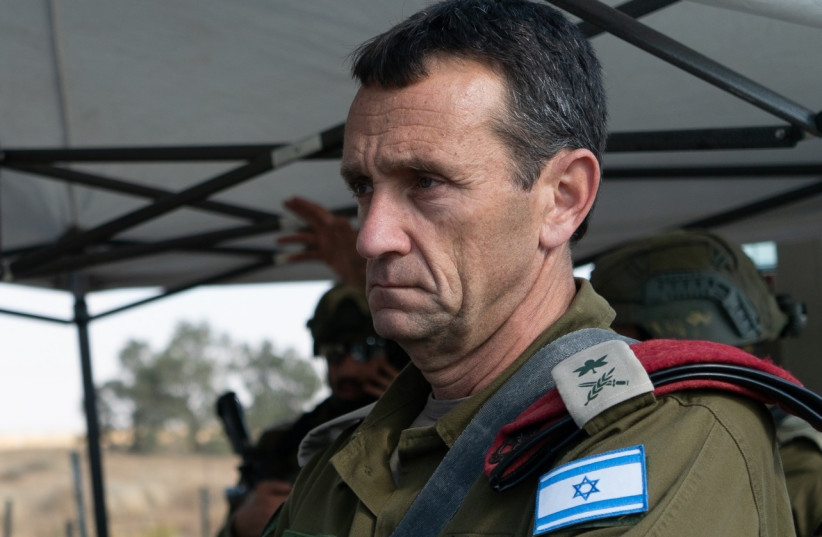by Yaakov Katz
New IDF chief Halevi knows that the greatest challenge he might face during his tenure has a better chance of coming from Israel’s political system than from Iran or Hezbollah.
 |
MAJ.-GEN. Herzi Halevi, who will take over as the next IDF chief of staff in January, speaks to troops along the Gaza border.
(photo credit: IDF)
|
On Tuesday, two Israeli officials – one former and one current – were in Washington, DC for high-level meetings. The first, former prime minister Naftali Bennett, flew to the US capital to give a speech at a think tank. On the sidelines, he went to the White House and met with National Security Adviser Jake Sullivan.
The second official was Maj.-Gen. Herzi Halevi, the incoming IDF chief of staff who will take over from Lt.-Gen. Aviv Kohavi in mid-January. He spent four days in the US, the highlight of which was a meeting with Chairman of the Joint Chiefs of Staff Gen. Mark A. Milley.
While it was nice of the White House to respect Bennett with a meeting, it was mostly about the past. It is no secret that the Biden administration would have wanted to see the Bennett-Lapid duo remain in office, but that is no longer relevant. In the coming days, prime minister-elect Benjamin Netanyahu and the most right-wing and religious government in Israeli history will take office.
Halevi’s meeting, on the other hand, was different. It was about the future.
The meeting itself was unique. While an incoming chief of staff spends a few months transitioning with his predecessor to learn the intricacies of the role and get up to speed on all relevant programs, the transition does not include a stop at the Pentagon for a meeting with the chairman of the joint chiefs.

But in 2022, it does for a variety of reasons. The first is as the Pentagon itself explained: The US and Israel maintain a strong military-to-military relationship that has reached new heights in recent years, particularly due to the constant need to counter Iranian aggression throughout the Middle East, something with which Israel is intimately familiar.
It shows something else, which the Americans did not reveal in the readout from the meeting: While the US is noticeably concerned with the composition of Netanyahu’s incoming government – for now it is sticking to a strategy of judging by policy and not personality – it does want to shore up defense relations and understands that it needs to have lines of communication that transcend the political echelon.
The invitation to Halevi before he even took up the role is a way of saying that the Americans want to strengthen the professional echelon, especially in the event that they will not be able to speak to the ministers themselves. We should expect the Halevi-Milley track to be all the more important in the years to come.
For Halevi, this will be a tough position to be in for a number of reasons. On the one hand, it is likely that he heard concern in Washington about the incoming government which he naturally shares even if he was not able to say so to his American colleagues. Halevi knows that the greatest challenge he might face during his tenure has a better chance of coming from Israel’s political system than from Iran or Hezbollah.
The controversy surrounding the recent incident in Hebron, where a Givati soldier was punished for making political statements, was just the latest example of this. The next time a soldier does something against the IDF conduct code and Itamar Ben-Gvir intervenes, what will Halevi do? It took Netanyahu three days last time to say something. What will happen when Ben-Gvir or Bezalel Smotrich attack Halevi? Will the prime minister again remain silent?
BUT THIS is only one concern for the incoming chief of staff, who is known for his quiet and thoughtful character. What he needs to realize is that on his watch the relationship with the US is going to be tested in ways that Israel hasn’t known in the last 40 years.
On the one hand, it is easy to put the blame for this on the makeup of the government and believe that Halevi has nothing to do with what will happen. If, for example, President Biden decides to downgrade relations because of some policy of the new government – like building in settlements – then that is right; it is not about Halevi.
Where he can make a difference, though, is in ensuring that Israel – and particularly the IDF – explains its actions and doesn’t fail to get out its version of controversial incidents as sadly happens too often. This was evident last weekend in the incident in Huwara, where a Border Policeman shot a Palestinian who had tried to steal his assault rifle.
The IDF decided not to get involved after the incident because it was a policeman who did the shooting and therefore left the media front to the Israel Police. The problem was that the Israel Police have a fraction of the staff and capabilities that the IDF Spokesperson’s Office has – resources, social media reach and more. While technically this was possible, in the West Bank, the Border Police operate under the command of the IDF and therefore there was reason for the military to take charge.
Nevertheless, the IDF didn’t, and the results were predictable. While the National Information Directorate in the Prime Minister’s Office did its best to fill the vacuum, the narrative that was set by an edited video of the incident that spread on social media led diplomats around the world to assume that the shooting was wrong and needed to be investigated. Israel was condemned and was slow to react.
Halevi needs to realize that these types of incidents do not go unnoticed in Washington – in the White House, the State Department and on Capitol Hill. Already, there are rumblings that Biden needs to reconsider the relationship with Israel simply due to the makeup of the government that is expected to be sworn in soon.
WHAT WILL happen the next time there is an incident like the one that took place in Huwara last Friday? What will happen if there is another accidental killing of a journalist in the West Bank; or if in the next Gaza operation, the IDF again decides to demolish a building where a Western news agency like the AP has its offices?
Incidents like these could be what pushes the administration to do what some former senior Democrats are calling for – to sanction the new government either by cutting off aid or suspending weapon sales.
This is why Halevi would do well to realize now that the public diplomacy front needs to be managed in the same way that the IDF fights on the traditional fronts it faces during a conflict. There is where the battle is being fought (Gaza, Lebanon, the West Bank); there is the home front where rockets are landing; and there is the public diplomacy front that plays out around the UN Security Council table and in the foreign media.
Media messaging shapes narratives, narratives shape opinions and opinions shape policies.
Halevi should not be envied. He is entering his role at a time of great uncertainty and amid massive challenges. He knows how important the IDF’s alliance is with the US and he got a taste of that this week while at the Pentagon. To protect it, he needs to understand the significance the IDF plays in shaping Israel’s messaging, and the way its management can influence operations, political stability and Israel’s international diplomatic standing.
Halevi needs to make this a priority and ensure that people who not only understand the news business, social media and how to craft a narrative are in the role, but also officers who have foreign experience and know how to predict and respond to international sensitivities.
What makes this all the more important is the delicate political atmosphere. Halevi cannot afford unnecessary mistakes. He needs to make sure that media vacuums are not created; that IDF messaging is quick, reliable and accurate, and that mistakes like what happened in Huwara or last year in Gaza don’t happen again.
Israel’s relationship with the US could depend on this.
Yaakov Katz
Source: https://www.jpost.com/opinion/article-724394
No comments:
Post a Comment